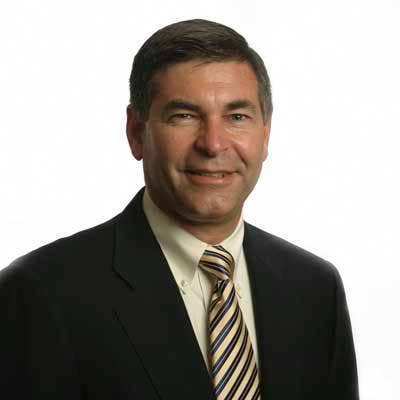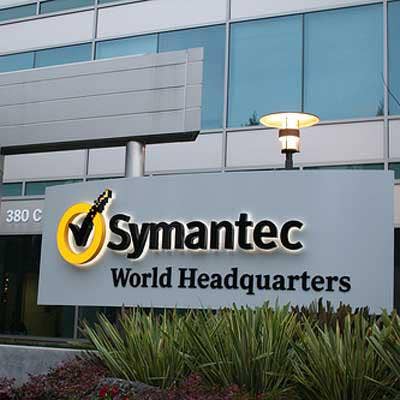CRN Exclusive: CEO Michael Brown On What Partners Can Expect From The 'New' Symantec

A New Era
In August, Symantec revealed it would be selling its storage business, Veritas Software, to private equity investor the Carlyle Group for $8 billion. Since then, the company has been driving full force to establish itself as a stand-alone security business in advance of the completion of the sale at the end of the year, including the launch of a new partner program in early October. Behind that push is CEO Michael Brown (pictured), who took on the top role 18 months ago. In a CRN exclusive interview with Brown and Executive Vice President of Sales Adrian Jones, Brown said the company is looking to double down on its investments in security, with acquisitions, new partner incentives and a refreshed approach to the channel.

How should we look at where Symantec stands right now?
Brown: We're in a turnaround of Symantec to get the business to be completely focused on security. You can see one of the steps we've taken, of course, is separating from the Veritas business, which will be its own independent company. That allows us to double down on security... Our real focus from a growth perspective for the future is on our enterprise security business... We've got a product strategy that supports that Unified Security company strategy and it's really resonating with customers... We believe that we're on the right path to get Symantec growing again. In fact, our enterprise business grew for the first time in two years in the June quarter. We're excited about a lot of the change that we're driving at Symantec. Symantec is the world's largest cybersecurity company that was a little bit obscured with the Veritas business, but now we're refocused on that and it's time to reassert our leadership in cybersecurity.

How do you view your position in the market today and how does the Veritas sale change that?
Brown: If you look at overall market position, as I said we're No. 1. We're probably twice as big as our next, nearest competitor in security, which would be Intel Security, what was formerly known as McAfee, followed by IBM and Cisco. I think what gets a lot of attention are the fast, small players that are growing, so there's tons of money being put in startups... What we see as our role is not only to continue with the products that we're known for in endpoint protection, DLP, but to broaden from there. We have a lot of new products, six to 12 new products that are coming in the second half of this fiscal year in enterprise security, so that we can simplify what for customers has become an overwhelmingly complex task... We believe that we're No. 1 in consumer and No. 1 in enterprise and therefore No. 1 in total. There's 15 different markets that we participate in and we have the No. 1, No. 2 or No. 3 position in 13 of those 15 markets.

How does the ' new' Symantec fit into a solution provider's vendor portfolio?
Brown: There's been a notion of wanting to buy best of breed, but I think now that's reaching some limits, at least we're hearing that from our customers, that they can't handle 50 or 100 vendors or technologies. They want to work with large players that can provide a large portion of their security needs... That's where they will look to a leading player like Symantec that has a broad offering that will supply more of what they need. As I'm sure you're following, the budgets for security continue to rise, even in an environment where IT budgets are getting squeezed. That's a recognition of how important cybersecurity is and how much more we can do to protect customers against those threats. I'm very bullish about what I see as a very encouraging environment for security spend and we just want to get more than our fair share of that.

You've got a storage background -- what did it feel like to sell the storage business?
Brown: I would say that stepping into the role 18 months ago, it became clear to me that we were pretty complex as an organization and we were not executing. Both of these markets, security and storage management software, are undergoing very dramatic change, as a lot of technology markets are, and you have to be nimble enough to keep up with those changes if you want to lead. It became clear to us that we would not be able to do that by continuing to try to do both and it was better to try to achieve some focus. What underlies that even more is the fact that security is an incredibly fast-growing market and a lot of new technology that is being developed there, some of which is happening at startups and some of it we're developing as well, and so to have the right investment focus to capitalize on that market opportunity we had to be focused and we had to be nimble. It just made sense.

What sort of investments can we expect after the Veritas sale completes?
Brown: There are three areas that we're focused on from a product and services space. One is threat protection -- these are the traditional products like endpoint, mail, gateway, data center and server security... That's most of our enterprise security revenue today and probably will likely be most of the revenue going forward for some time. The next product area is information protection, which is actually one of our faster-growing areas and the next frontier in security... The third area for us is cybersecurity services... This is going to be an increasing area of growth for us because there's not enough security professionals out there in the world to monitor all these environment, so more people are turning to us. We've got the tools, we've got the experience to do many more of these environments from a monitoring standpoint.

Will you be making acquisitions? Where will they be?
Brown: You can definitely expect acquisitions from us... This combination of threat protection, information protection and cybersecurity services are the areas we intend to build as part of the Symantec enterprise security strategy, and then it's also the area where we will see acquisitions being focused. We're not looking outside those areas. We're not a security roll-up; we're not envisioning ourselves being a one-stop-shop for customers. We can provide them a broad range of products and services, but that's where we want to be focused. We're not claiming we're going to be able to do everything... Acquisitions will be an important part of the strategy for us, but we're also going to be focused on organic growth. We're devoting more R&D dollars to enterprise security than we ever had before and a higher percentage of our revenue in that investment. We're bringing out the six to 12 products from now until the end of our fiscal year in March -- those will all be organically developed.

You'll have a few extra billion dollars after the Veritas sale, how much money will you put toward R&D and toward acquisitions?
Brown: In terms of R&D, we're spending a little more than $1 billion in R&D. In terms of acquisitions, we haven't really talked about what a budget for that will be. Obviously, we have a lot of flexibility in terms of the additional cash that we have access to January 1 when the transaction closes. I will be quick to say that that will be money that won't be burning a hole in our pockets. We're going to be very judicious as we look at these acquisitions to make sure they tightly fit with our strategy and that we have a good plan to integrate them.

What size of acquisition will you be making? Startups? Blockbuster buys?
Brown: If you look at the valuation in the security space, of course they are very, very rich these days. What we think would be the smartest thing for us to do is look at complementary technologies where we can really use the go-to-market capabilities and strong channel partner network that we have and the enterprise sales force that [Executive Vice President of Sales Adrian Jones] is building so we can take those technologies and ensure they are more widely deployed. What we don't need to do is use our cash balance to buy revenue, per se, buying something because it has another $100 [million] or $200 million in revenue is not important to us. It's only important to the extent that that is a validation of a successful technology in the marketplace, not that we need to buy revenue.

Talk about your plans for the channel.
Brown: [Partners] can definitely expect to see a lot of change and they've already seen a lot of change in the last year.
Jones: The first thing is to not only talk about partner incentives or anything else, it's about focus. The focus change is a dramatic change ... with focus from us as a security company going back to our roots. Second, we need focus from [partners] to be focused on growth, growth around all of the three pillars of our strategy that we haven't got the outcome focus we ' ve wanted before ... For us, it's about how we change that focus and also at the same time how we organically grow our own road map, our Unified Security strategy, complementing that with M&A. I think the biggest thing that they're going to see different for us is really the focus around security as one, pure security organization that isn't an information management storage business as well as a security business.

I s there a particular type of partner that you will be targeting going forward?
Jones: First of all, I don't want you to have a view that we're going to change the partner landscape as far as existing partners. They are incredibly important to us, the partners that we have right now. The key for us, first of all, is that we are training our partners with what we're trying to do with the Unified Security strategy, making sure they are up to speed on that and making sure their sales reps are trained and armed and know how to go out and sell the new Symantec... Then, how do we complement that with the landscape and coverage model that we want... We want to touch more buying points in the commercial landscape and commercial named accounts... I think we're really looking for partners large and small that can help us do that. The first thing for us is making sure to solidify the landscape that we have and make sure that the partners know what they are doing with the current products we have. It's not about just recruitment for us, it's making sure we make our existing partners successful and get the growth we need from them.

How significant do you see the channel being as part of the new Symantec?
Brown: More than three-quarters of our revenue on the enterprise side comes from partners.
Jones: Yes. We still have 81 percent coming out of the partner landscape today... We've been in business since 1982 -- this isn't something new for us. It's how we evolve our channel and we're not waking up with a new Unified Security strategy and deciding to be a channel company. We are a channel company. I think that's the difference with us. We're the largest channel company on the planet today. We want to just continue to drive more focus with them, particularly with the change we have in the company and the strategy to get the right focus and attention we need.

What do you say to partners who are feeling very uncertain about Symantec right now?
Brown: I think there's a lot of uncertainty out there. I think there's been a lot uncertainty about where is Symantec going. I think having the Veritas business and we just launched a new channel program ... they are wondering what changes does the separation imply both for the partners that we will be focused on and what will the partner program look like? We think this will provide some clarity in terms of where Symantec is going and what our strategy is. We want to make sure that everyone knows, if they don't come in knowing already, that we're doubling down on security and what the Unified Security strategy is all about, and how that helps them, and what it does for their customers. This is also a chance to reinforce that the basics of the channel program, the key principles it is based on, are really not changing as we go forward. I'm not surprised the uncertainty is out there and this will be a great chance for us to be talking to our partners about what we bring to the table.

What will you be doing to ensure consistency for channel partners going forward?
Jones: Symantec has had different strategies on channel and we've not had the right focus and attention on the right areas of security -- that's changed now. My hope is that in a year we go show up and we show up with the same Unified Security strategy that we have this year... At the end of the day, we want to create stability in the channel, we want to create stability with the partners that we have around … our strategy and what we're doing so that we can continue to make sure that we are consistent in our approach to the channel, consistent with our strategy and I think that is where some of the nervousness has been coming from in the last 12 months or a year. They've seen a lot of change. We're not planning to make changes all the time [anymore]. We're planning to get stability back into our business, growth in our business, so that partners can feel comfortable with the strategy and we execute on what we say we are going to do.

Do you predict you will be able to convert mind share away from your competitors?
Brown: I think there's no question about that. I think you've heard customers say "we think you've been absent," which means we haven't heard your voice and we don't know where you're heading and I think there's an opportunity to reassert what we stand for and where we're going. I think that's going to give partners the confidence to invest in us and in our products and take that out to customers. I think if they are uncertain about where they stand, where we stand, then they naturally will look to other voices who are louder and more consistent in the marketplace ... That's a key part of what we need to do now is make sure that our voice is there and we're being consistent.

What can partners expect from the Symantec road map in the next 30 days?
Jones: Two things. First of all, as you know we've got Partner Engage coming up in October in the United States. That's to roll out the new channel program to make sure that's all aligned with the strategy we have around not just unified security but what we're doing with them in our program and getting them on board with what our expectations are with the partner community and getting their guidance and their input on how we go forward. That's the next 30 days.

What about the Symantec road map for the next year?
Jones: My hope is that [partners] view the program favorably, they look at how they invest more with Symantec so they cannot just sell one product but the portfolio of technologies that we have and drive outcomes and solutions for customers in a very different way than what we've seen in the last 12 months. That's really our hope. We know we have to earn it. We know we have to work at it. We know it's a journey and it's not going to happen overnight, but over the next 12 months we hope that we see a much different result for them and for us.
Brown: We're providing the incentive for those partners who invest with us and get certified to actually achieve better economics. Our hope is that we're going to be building a stronger partner community that is more aligned with us, they'll know more about our strategy, they'll invest with us to learn more about the product to be more effective with their customers and they will be growing and achieve more profit dollars with us.

What's the opportunity in security right now over all?
Brown: When Adrian and I go around and visit customers worldwide, some of the largest financial services companies, health care, security is becoming an increasingly important topic for them, all the way up to the top CEOs and boardrooms. They are going to be spending more to make sure they are protected and they are looking for some answers. We're trying to provide a more simplified view, conceived more holistically ... this strategy, which is really based on security analytics, is really resonating with them. They really see that this is where the future is going in security and, from what I've heard, they're glad that we're stepping up to the challenge.